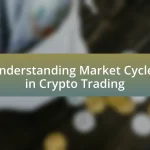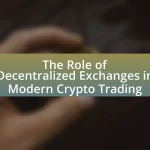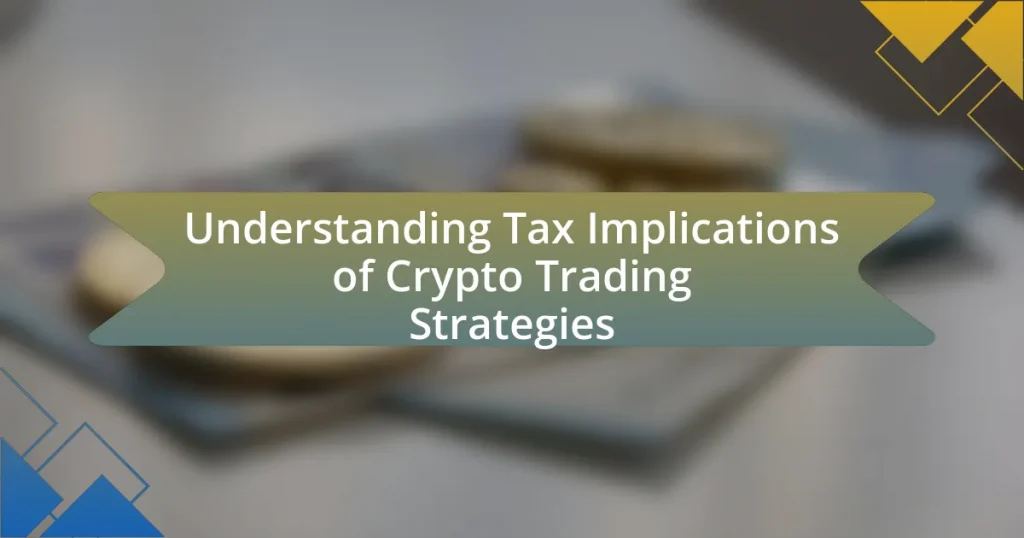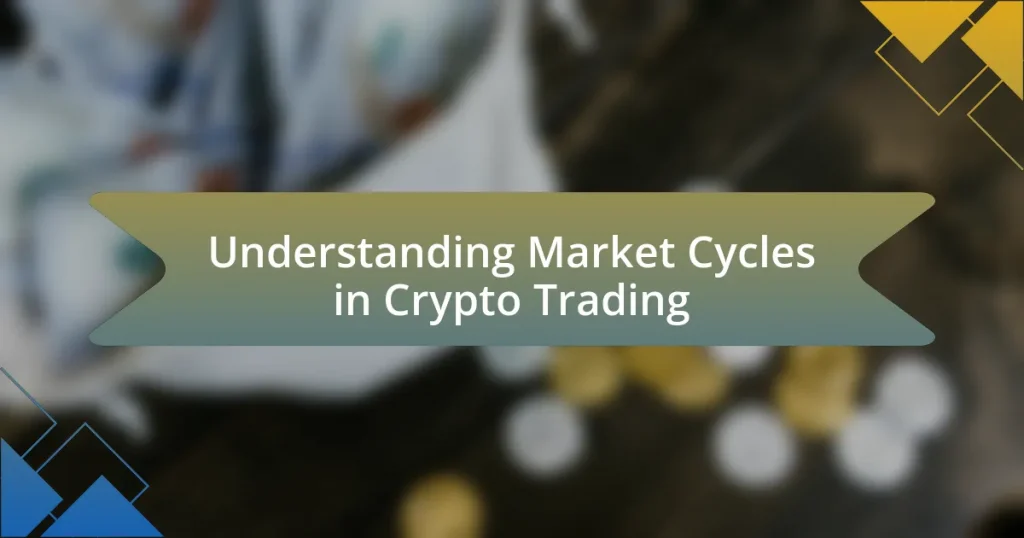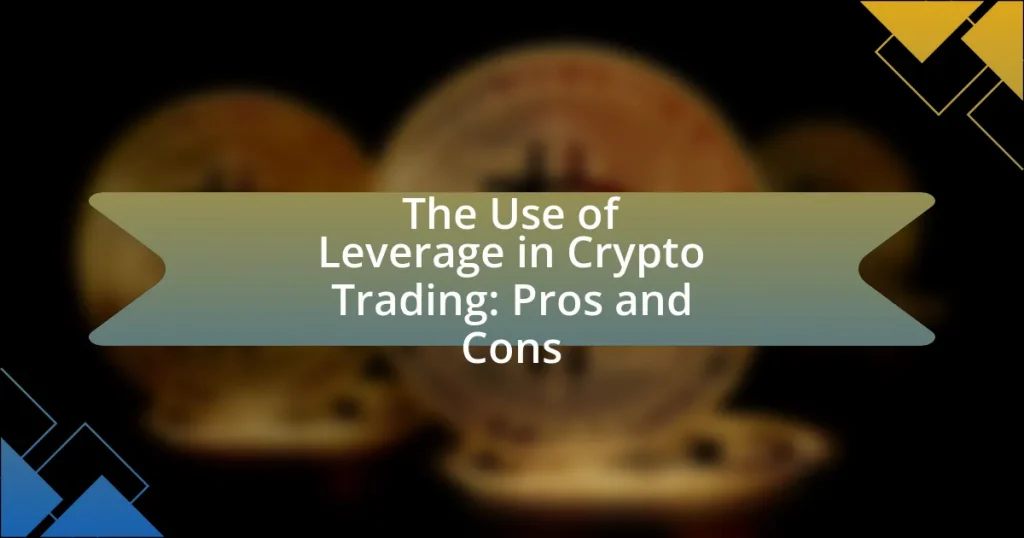Decentralized exchanges (DEXs) are platforms that facilitate cryptocurrency trading without centralized control, presenting unique regulatory challenges due to their inherent anonymity and operational structure. This article examines the significant regulatory hurdles DEXs face, including compliance with anti-money laundering (AML) and know-your-customer (KYC) requirements, as well as the ambiguous legal status of tokens in various jurisdictions. It discusses the impact of existing regulations, such as the Financial Action Task Force (FATF) guidelines and the European Union’s Markets in Crypto-Assets (MiCA) regulation, on DEX operations. Additionally, the article highlights the importance of regulatory compliance for user trust and market integrity, the risks associated with non-compliance, and strategies DEXs can adopt to navigate the evolving regulatory landscape.

What are the Regulatory Challenges for Decentralized Exchanges?
Decentralized exchanges face significant regulatory challenges primarily due to their lack of centralized control and the anonymity they offer users. These platforms often operate outside traditional financial regulations, leading to difficulties in compliance with anti-money laundering (AML) and know-your-customer (KYC) requirements. For instance, the Financial Action Task Force (FATF) has issued guidelines that require exchanges to implement KYC measures, yet many decentralized exchanges do not have the infrastructure to enforce these regulations effectively. Additionally, the classification of tokens and the legal status of decentralized finance (DeFi) products remain ambiguous in many jurisdictions, complicating regulatory oversight and enforcement. This regulatory uncertainty can hinder the growth and adoption of decentralized exchanges, as they may face legal repercussions or restrictions from governments seeking to regulate the cryptocurrency market.
How do regulations impact the operation of decentralized exchanges?
Regulations significantly impact the operation of decentralized exchanges by imposing compliance requirements that can limit their functionality and accessibility. For instance, regulations may require decentralized exchanges to implement Know Your Customer (KYC) and Anti-Money Laundering (AML) procedures, which can contradict the fundamental principle of anonymity that many users seek in decentralized platforms. Additionally, regulatory scrutiny can lead to the delisting of certain tokens or the halting of services in specific jurisdictions, as seen in cases where exchanges have had to adapt to local laws to avoid penalties. This regulatory landscape can create uncertainty, affecting user trust and participation in decentralized exchanges.
What specific regulations are currently affecting decentralized exchanges?
Decentralized exchanges (DEXs) are currently affected by regulations such as the Financial Action Task Force (FATF) guidelines, which mandate that DEXs implement Know Your Customer (KYC) and Anti-Money Laundering (AML) measures. Additionally, the European Union’s Markets in Crypto-Assets (MiCA) regulation aims to create a comprehensive regulatory framework for crypto assets, impacting how DEXs operate within EU jurisdictions. In the United States, the Securities and Exchange Commission (SEC) has indicated that certain tokens traded on DEXs may be classified as securities, subjecting them to additional regulatory scrutiny. These regulations are designed to enhance consumer protection and prevent illicit activities within the cryptocurrency ecosystem.
How do different jurisdictions approach regulation of decentralized exchanges?
Different jurisdictions adopt varied approaches to the regulation of decentralized exchanges (DEXs), reflecting their unique legal frameworks and policy objectives. For instance, the United States primarily views DEXs through the lens of existing securities laws, with the Securities and Exchange Commission (SEC) asserting that many tokens traded on these platforms may qualify as securities, thus subjecting them to stringent regulatory requirements. In contrast, the European Union is working on a comprehensive regulatory framework known as the Markets in Crypto-Assets (MiCA) regulation, which aims to create a harmonized approach across member states, focusing on consumer protection and market integrity while allowing for innovation.
In Asia, jurisdictions like Singapore have adopted a more progressive stance, implementing a licensing regime under the Payment Services Act that encourages DEXs to comply with anti-money laundering (AML) and counter-terrorism financing (CTF) regulations without stifling innovation. Conversely, countries like China have taken a restrictive approach, outright banning cryptocurrency trading and initial coin offerings (ICOs), which directly impacts the operation of DEXs within its borders.
These regulatory differences highlight the challenges DEXs face in navigating compliance across multiple jurisdictions, as they must adapt to a patchwork of laws that can vary significantly in terms of enforcement and interpretation.
Why is regulatory compliance important for decentralized exchanges?
Regulatory compliance is crucial for decentralized exchanges because it ensures legal operation and protects users from fraud and market manipulation. By adhering to regulations, decentralized exchanges can build trust with users and attract institutional investors, which is essential for long-term sustainability. Compliance also mitigates the risk of legal penalties and operational shutdowns, as seen in cases where exchanges faced significant fines for non-compliance with anti-money laundering (AML) and know your customer (KYC) regulations. For instance, in 2021, the Financial Crimes Enforcement Network (FinCEN) imposed a $60 million penalty on a cryptocurrency exchange for failing to implement adequate AML measures. Thus, regulatory compliance not only safeguards the exchange’s reputation but also contributes to the overall integrity of the cryptocurrency market.
What risks do decentralized exchanges face without regulatory compliance?
Decentralized exchanges face significant risks without regulatory compliance, including legal repercussions, increased vulnerability to fraud, and reduced user trust. Legal repercussions arise because operating without compliance can lead to enforcement actions from regulatory bodies, resulting in fines or shutdowns. Increased vulnerability to fraud occurs as the lack of oversight allows malicious actors to exploit users, leading to potential financial losses. Reduced user trust is evident as users may hesitate to engage with platforms that do not adhere to established regulations, impacting liquidity and overall market participation. These risks highlight the critical importance of regulatory compliance for the sustainability and security of decentralized exchanges.
How can regulatory compliance enhance user trust in decentralized exchanges?
Regulatory compliance can enhance user trust in decentralized exchanges by establishing a framework of accountability and security. When decentralized exchanges adhere to regulations, they demonstrate a commitment to protecting users from fraud and ensuring fair trading practices. For instance, compliance with anti-money laundering (AML) and know your customer (KYC) regulations can help prevent illicit activities, thereby fostering a safer trading environment. According to a report by Chainalysis, exchanges that implement robust compliance measures experience lower rates of fraud and higher user retention. This alignment with regulatory standards reassures users that their assets are safeguarded, ultimately building confidence in the platform’s integrity and reliability.
What are the potential consequences of non-compliance for decentralized exchanges?
Non-compliance for decentralized exchanges can lead to severe legal and financial repercussions. Regulatory authorities may impose hefty fines, as seen in cases where exchanges failed to adhere to anti-money laundering (AML) and know-your-customer (KYC) regulations, resulting in penalties exceeding millions of dollars. Additionally, non-compliance can lead to the suspension of operations or outright bans in certain jurisdictions, limiting market access and user engagement. Furthermore, the reputational damage from non-compliance can deter users and investors, leading to decreased trading volumes and liquidity, as evidenced by the decline in user trust following regulatory actions against non-compliant platforms.
What legal actions can be taken against non-compliant decentralized exchanges?
Legal actions against non-compliant decentralized exchanges include regulatory fines, cease and desist orders, and potential criminal charges. Regulatory bodies, such as the Securities and Exchange Commission (SEC) in the United States, can impose fines for violations of securities laws if the exchange facilitates trading of unregistered securities. Additionally, authorities can issue cease and desist orders to halt operations until compliance is achieved. In severe cases, individuals involved may face criminal charges for facilitating illegal financial activities, as seen in past enforcement actions against similar entities.
How does non-compliance affect the reputation of decentralized exchanges?
Non-compliance significantly damages the reputation of decentralized exchanges by undermining user trust and attracting regulatory scrutiny. When decentralized exchanges fail to adhere to legal standards, they risk being labeled as unsafe or illegitimate, which can deter potential users and investors. For instance, in 2021, several decentralized exchanges faced backlash and decreased user engagement after being linked to illicit activities, leading to a decline in their market presence. This negative perception can result in lower trading volumes and reduced liquidity, further harming their standing in the cryptocurrency ecosystem.

What are the Key Regulatory Trends Affecting Decentralized Exchanges?
Key regulatory trends affecting decentralized exchanges include increased scrutiny from financial authorities, the push for compliance with anti-money laundering (AML) and know your customer (KYC) regulations, and the development of specific legislation targeting digital assets. Regulatory bodies like the Financial Action Task Force (FATF) have emphasized the need for decentralized exchanges to implement AML and KYC measures, which has led to a growing expectation for these platforms to adopt similar compliance frameworks as centralized exchanges. Additionally, countries such as the United States and members of the European Union are actively working on regulatory frameworks that could impose stricter operational requirements on decentralized exchanges, aiming to enhance consumer protection and market integrity. These trends indicate a shift towards greater regulatory oversight in the decentralized finance space, reflecting the evolving landscape of digital asset regulation.
How are governments worldwide responding to the rise of decentralized exchanges?
Governments worldwide are increasingly implementing regulatory frameworks to address the rise of decentralized exchanges (DEXs). For instance, the European Union has proposed the Markets in Crypto-Assets (MiCA) regulation, which aims to create a comprehensive regulatory framework for cryptocurrencies and DEXs, ensuring consumer protection and market integrity. Similarly, the U.S. Securities and Exchange Commission (SEC) has intensified scrutiny on DEXs, emphasizing that many tokens traded on these platforms may qualify as securities, thus subjecting them to existing securities laws. In Asia, countries like Japan have established licensing requirements for cryptocurrency exchanges, including DEXs, to enhance oversight and prevent illicit activities. These actions reflect a global trend towards regulating decentralized finance to mitigate risks associated with fraud, money laundering, and market manipulation.
What new regulations are being proposed for decentralized exchanges?
New regulations proposed for decentralized exchanges (DEXs) primarily focus on enhancing consumer protection, anti-money laundering (AML) compliance, and ensuring transparency in operations. The European Union’s Markets in Crypto-Assets (MiCA) regulation, for instance, aims to establish a comprehensive framework for crypto assets, including DEXs, mandating registration and compliance with AML directives. Additionally, the Financial Action Task Force (FATF) has recommended that DEXs implement Know Your Customer (KYC) protocols to prevent illicit activities. These proposals reflect a growing trend among regulators to impose stricter oversight on the cryptocurrency market to mitigate risks associated with fraud and market manipulation.
How are existing regulations evolving to address decentralized exchanges?
Existing regulations are evolving to address decentralized exchanges by increasingly focusing on compliance with anti-money laundering (AML) and know-your-customer (KYC) requirements. Regulatory bodies, such as the Financial Action Task Force (FATF), have issued guidelines that classify decentralized exchanges as virtual asset service providers, thereby subjecting them to the same regulatory scrutiny as traditional financial institutions. For instance, the European Union’s Markets in Crypto-Assets (MiCA) regulation aims to create a comprehensive framework that includes provisions for decentralized finance (DeFi) platforms, ensuring they adhere to consumer protection and market integrity standards. This evolution reflects a global trend towards greater oversight, as regulators seek to mitigate risks associated with illicit activities and enhance transparency in the cryptocurrency market.
What role do international organizations play in regulating decentralized exchanges?
International organizations play a crucial role in regulating decentralized exchanges by establishing guidelines and frameworks that promote compliance with anti-money laundering (AML) and counter-terrorism financing (CTF) standards. For instance, the Financial Action Task Force (FATF) has issued recommendations that require decentralized exchanges to implement measures similar to those of traditional financial institutions, such as customer due diligence and transaction monitoring. These guidelines aim to mitigate risks associated with anonymity and facilitate cooperation among countries in enforcing regulations. Additionally, organizations like the International Organization of Securities Commissions (IOSCO) provide a platform for regulatory harmonization, helping to address the challenges posed by the cross-border nature of decentralized exchanges.
How do international regulatory frameworks impact decentralized exchanges?
International regulatory frameworks significantly impact decentralized exchanges by imposing compliance requirements that can affect their operational viability. These frameworks often mandate Know Your Customer (KYC) and Anti-Money Laundering (AML) regulations, which decentralized exchanges may struggle to implement due to their inherent design that prioritizes user anonymity and autonomy. For instance, the Financial Action Task Force (FATF) has issued guidelines that require exchanges to collect and share user information, which can lead to operational challenges for decentralized platforms that do not have centralized control. Additionally, regulatory scrutiny can lead to increased legal risks and potential penalties, influencing the willingness of users to engage with decentralized exchanges.
What collaborative efforts exist among countries to regulate decentralized exchanges?
Countries are increasingly collaborating to regulate decentralized exchanges through initiatives like the Financial Action Task Force (FATF) guidelines, which promote a unified approach to anti-money laundering (AML) and combating the financing of terrorism (CFT). The FATF has established a framework that encourages member countries to implement regulations that require decentralized exchanges to comply with AML/CFT standards, thereby fostering international cooperation. Additionally, organizations such as the International Organization of Securities Commissions (IOSCO) are working to create a global regulatory framework that addresses the unique challenges posed by decentralized finance (DeFi) and its associated risks. These collaborative efforts aim to enhance regulatory clarity and ensure that decentralized exchanges operate within a safe and compliant environment.
What are the implications of regulatory trends for the future of decentralized exchanges?
Regulatory trends are likely to impose stricter compliance requirements on decentralized exchanges, potentially limiting their operational flexibility. As governments worldwide increasingly focus on anti-money laundering (AML) and know-your-customer (KYC) regulations, decentralized exchanges may face pressure to implement these measures, which could undermine their core principle of anonymity. For instance, the Financial Action Task Force (FATF) has recommended that jurisdictions regulate virtual asset service providers, including decentralized exchanges, to prevent illicit activities. This shift could lead to a bifurcation in the market, where compliant platforms thrive while non-compliant ones face legal challenges or shutdowns. Additionally, regulatory clarity may foster greater institutional participation in decentralized finance (DeFi), as firms seek to navigate the evolving landscape safely.
How might future regulations shape the development of decentralized exchanges?
Future regulations are likely to significantly influence the development of decentralized exchanges by imposing compliance requirements that could affect their operational frameworks. As governments and regulatory bodies seek to address concerns related to money laundering, consumer protection, and market integrity, decentralized exchanges may need to implement Know Your Customer (KYC) and Anti-Money Laundering (AML) protocols. For instance, the Financial Action Task Force (FATF) has recommended that all cryptocurrency exchanges, including decentralized ones, adhere to these standards, which could lead to a shift in how these platforms operate. Additionally, regulatory clarity could foster greater institutional participation in decentralized finance, as firms would be more willing to engage with compliant platforms, thus shaping the market dynamics and technological advancements within the sector.
What opportunities could arise from regulatory clarity for decentralized exchanges?
Regulatory clarity for decentralized exchanges could lead to increased institutional participation. Clear regulations would provide a framework that mitigates legal risks, encouraging traditional financial institutions to engage with decentralized platforms. For instance, a report by the Financial Stability Board in 2020 highlighted that regulatory frameworks could enhance market integrity and investor protection, which are critical for institutional investors. Additionally, regulatory clarity could foster innovation by allowing developers to create compliant products that meet legal standards, thus expanding the range of services offered on decentralized exchanges.

What Strategies Can Decentralized Exchanges Employ to Navigate Regulatory Challenges?
Decentralized exchanges can employ several strategies to navigate regulatory challenges, including implementing robust compliance frameworks, engaging with regulators proactively, and utilizing decentralized governance models. By establishing compliance frameworks, these exchanges can ensure adherence to anti-money laundering (AML) and know your customer (KYC) regulations, which are critical in many jurisdictions. Proactive engagement with regulators allows decentralized exchanges to stay informed about regulatory developments and contribute to the creation of favorable regulations. Additionally, decentralized governance models can distribute decision-making power among users, potentially reducing the regulatory burden on a single entity and enhancing transparency. These strategies are supported by the increasing trend of regulatory bodies seeking to understand and adapt to the evolving landscape of decentralized finance, as evidenced by initiatives from organizations like the Financial Action Task Force (FATF) that aim to provide guidance on the regulation of virtual assets.
How can decentralized exchanges ensure compliance with regulations?
Decentralized exchanges can ensure compliance with regulations by implementing robust Know Your Customer (KYC) and Anti-Money Laundering (AML) protocols. These measures involve verifying the identities of users and monitoring transactions for suspicious activity, which aligns with regulatory requirements set by financial authorities. For instance, jurisdictions like the European Union mandate that exchanges adhere to the Fifth Anti-Money Laundering Directive, which necessitates user identification and transaction reporting. By integrating these compliance frameworks, decentralized exchanges can operate within legal boundaries while maintaining their core decentralized principles.
What best practices should decentralized exchanges adopt for regulatory compliance?
Decentralized exchanges should adopt best practices such as implementing Know Your Customer (KYC) procedures, ensuring Anti-Money Laundering (AML) compliance, and maintaining transparent transaction records. KYC procedures help verify the identities of users, which is crucial for meeting regulatory requirements and preventing illicit activities. AML compliance involves monitoring transactions for suspicious activities, thereby reducing the risk of financial crimes. Additionally, maintaining transparent transaction records aids in regulatory audits and fosters trust among users. These practices align with guidelines from regulatory bodies like the Financial Action Task Force (FATF), which emphasizes the importance of compliance in the cryptocurrency sector.
How can decentralized exchanges engage with regulators effectively?
Decentralized exchanges can engage with regulators effectively by establishing transparent communication channels and actively participating in regulatory discussions. By providing regulators with insights into their operational frameworks, decentralized exchanges can demonstrate compliance with existing laws and regulations. For instance, initiatives like the Global Digital Finance initiative have shown that collaboration between industry players and regulators can lead to better understanding and development of appropriate regulatory frameworks. Engaging in public consultations and offering feedback on proposed regulations can further enhance this relationship, ensuring that decentralized exchanges are not only compliant but also influential in shaping the regulatory landscape.
What technological solutions can assist decentralized exchanges in meeting regulatory requirements?
Technological solutions that can assist decentralized exchanges in meeting regulatory requirements include blockchain analytics tools, identity verification systems, and smart contract compliance protocols. Blockchain analytics tools enable the monitoring of transactions for suspicious activities, thereby ensuring compliance with anti-money laundering (AML) and know your customer (KYC) regulations. Identity verification systems, such as decentralized identity solutions, help exchanges verify user identities while maintaining privacy. Smart contract compliance protocols can automate adherence to regulatory standards by embedding rules directly into the code, ensuring that transactions comply with legal requirements. These solutions collectively enhance transparency and accountability, which are critical for regulatory compliance in the evolving landscape of decentralized finance.
How can blockchain technology be leveraged for compliance purposes?
Blockchain technology can be leveraged for compliance purposes by providing transparent, immutable records of transactions that facilitate regulatory oversight. This transparency allows regulators to access real-time data on transactions, ensuring adherence to anti-money laundering (AML) and know your customer (KYC) regulations. For instance, the use of smart contracts can automate compliance checks, reducing the risk of human error and increasing efficiency in reporting. Additionally, blockchain’s decentralized nature can enhance data security, making it harder for malicious actors to alter compliance records. These features collectively support a more robust compliance framework in the context of decentralized exchanges, addressing regulatory challenges effectively.
What role does smart contract auditing play in regulatory compliance for decentralized exchanges?
Smart contract auditing is crucial for regulatory compliance in decentralized exchanges as it ensures that the code governing transactions is secure, transparent, and adheres to legal standards. By identifying vulnerabilities and ensuring that smart contracts function as intended, auditing helps mitigate risks associated with fraud and non-compliance with regulations such as anti-money laundering (AML) and know your customer (KYC) requirements. For instance, a report by the Blockchain Security Company in 2021 indicated that 70% of smart contract vulnerabilities could be detected through thorough auditing, thereby enhancing trust and accountability in decentralized platforms. This proactive approach not only protects users but also aligns decentralized exchanges with evolving regulatory frameworks, ultimately fostering a safer trading environment.
What are the common pitfalls decentralized exchanges should avoid regarding regulations?
Decentralized exchanges should avoid the pitfalls of non-compliance with anti-money laundering (AML) and know your customer (KYC) regulations. Failing to implement these measures can lead to legal repercussions, including fines and shutdowns, as seen in cases like the BitMEX lawsuit in 2020, where the exchange faced charges for operating without proper KYC protocols. Additionally, decentralized exchanges must be cautious about listing tokens that may be classified as securities, as this can trigger regulatory scrutiny, exemplified by the SEC’s actions against various platforms for offering unregistered securities. Lastly, inadequate transparency in operations can result in regulatory challenges, as regulators increasingly demand clear reporting and operational practices to ensure consumer protection and market integrity.
What mistakes have other decentralized exchanges made in regulatory compliance?
Decentralized exchanges have made several mistakes in regulatory compliance, primarily by failing to implement adequate Know Your Customer (KYC) and Anti-Money Laundering (AML) procedures. For instance, platforms like EtherDelta faced scrutiny for allowing users to trade without verifying their identities, leading to enforcement actions from the U.S. Securities and Exchange Commission (SEC). Additionally, some exchanges neglected to register as money services businesses, which resulted in legal challenges and fines. These oversights highlight the importance of adhering to regulatory frameworks to avoid penalties and ensure operational legitimacy.
How can decentralized exchanges learn from past regulatory challenges faced by others?
Decentralized exchanges can learn from past regulatory challenges faced by centralized exchanges by analyzing specific cases where regulatory compliance issues led to significant penalties or operational changes. For instance, the 2017 crackdown on initial coin offerings (ICOs) by the U.S. Securities and Exchange Commission (SEC) highlighted the importance of understanding securities laws, prompting exchanges to implement stricter compliance measures. Additionally, the fines imposed on Bitfinex and Binance for regulatory violations serve as cautionary examples, demonstrating the need for proactive engagement with regulators and adherence to local laws. By studying these instances, decentralized exchanges can develop frameworks that prioritize transparency, user verification, and legal compliance to mitigate risks associated with regulatory scrutiny.

